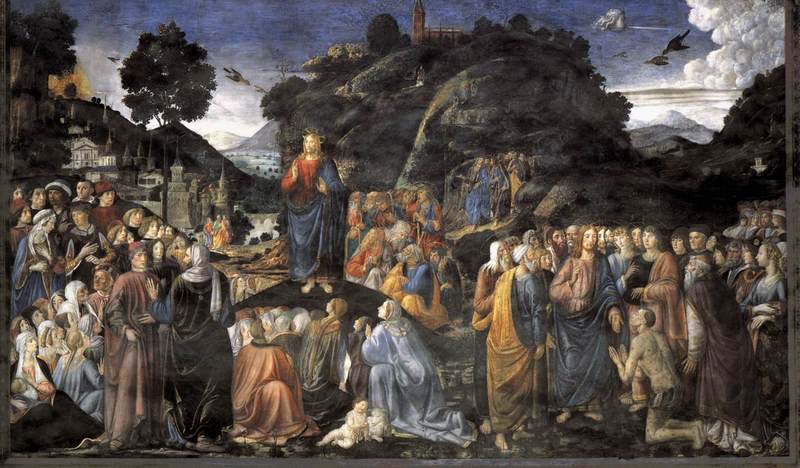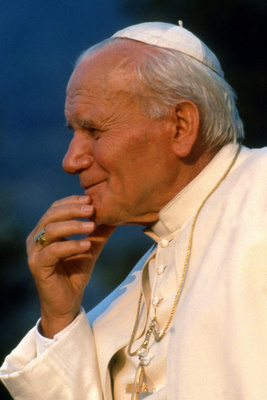As the Church continues her pilgrim journey throughout history, we need a vision to sustain us and give us hope in the midst of our shadows, ambiguities and sins, our joys and hopes and victories. That biblical vision is found in the great Christian charter in today’s Gospel passage. Today’s Gospel often called “the Sermon on the Mount” [Mt 5:1-12a] is the first of the five discourses [5:1-7:29] that are a central part of the structure of Matthew’s Gospel. The Lucan parallel is the “Sermon on the Plain” [Luke 6:20-49], although some of the sayings in Matthew’s “Sermon on the Mount” have their parallels in other parts of Luke.
 The careful topical arrangement of the sermon is probably not due only to Matthew’s editing; he seems to have had a structured discourse of Jesus as one of his sources. The form of that source may have been as follows: four beatitudes [Matthew 5:3-4, 6, 11-12], a section on the new righteousness with illustrations [5:17, 20-24, 27-28, 33-48], a section on good works, [6:1-6, 16-18], and three warnings [7:1-2, 15-21, 24-27]. Unlike Luke’s sermon, Matthew’s text is addressed not only to the disciples but to the crowds.
The careful topical arrangement of the sermon is probably not due only to Matthew’s editing; he seems to have had a structured discourse of Jesus as one of his sources. The form of that source may have been as follows: four beatitudes [Matthew 5:3-4, 6, 11-12], a section on the new righteousness with illustrations [5:17, 20-24, 27-28, 33-48], a section on good works, [6:1-6, 16-18], and three warnings [7:1-2, 15-21, 24-27]. Unlike Luke’s sermon, Matthew’s text is addressed not only to the disciples but to the crowds.
The formulation “Blessed are (is)” used in today’s Gospel passage occurs frequently in the Old Testament in the Wisdom literature and in the psalms. Although modified by Matthew, the first, second, fourth, and ninth beatitudes have Lucan parallels (Matthew 5:3; Luke 6:20; Matthew 5:4; Luke 6:21, 22; Matthew 5:6; Luke 6:21a; Matthew 5:11-12; Luke 5:22-23). The others were added by the evangelist and are probably his own composition.
The meaning of the beatitudes
The beatitudes are the great charter for Christian living. They reveal God’s ultimate justice and outline Jesus’ prophetic outreach to those who live on the fringes of society. So many people– the sick, the lame, the poor and the hungry converge on Jesus on that Galilean hillside. In this awesome biblical scene overlooking the Sea, Jesus puts biblical justice into practice by proclaiming the beatitudes. Authentic justice is a bonding of one’s self with the sick, the disabled, the poor and the hungry. The crowds that listened to Jesus were awestruck because he spoke with authority, with the force of someone who knew the truth and offered it freely to others. He was a teacher like no other.
While today’s Gospel is undoubtedly one of the favorite texts for all types of liturgical celebrations, how many people really grasp the radicality of what is being stated or realize that the beatitudes are not simply a lovely introduction to the sermon on the mount but actually the foundation of Jesus’ entire teaching? We are often at a loss to understand and explain the meaning of the beatitudes beyond the fact that they are words of solidarity, compassion and blessing. The Aramaic language of Jesus may help us to understand Jesus’ teachings in a deeper way. “Blessed” is the translation of the word “makarioi” used in the Greek New Testament. If we look further back to Jesus’ Aramaic language and vocabulary, we discover that the original word was “ashray,” from the verb “yashar.” “Ashray” does not have this passive quality. Instead, it means “to set yourself on the right way for the right goal; to turn around, repent; to become straight or righteous.”
When we understand Jesus’ words in the Aramaic, we may translate the beatitudes like this: “Get up, go ahead, do something, move, you who are hungry and thirsty for justice; you who desire peace.” This reflects Jesus’ words and teachings more accurately. We hear him saying to us: Get up, stop complaining, do something about the homeless, about the poor, about the discouraged and disillusioned people around you. “Get up, go ahead, do something, move,” Jesus says to his disciples and to us. In this way the beatitudes reveal God’s ultimate justice and solidarity with the human condition.
We must hold up the beatitudes as a mirror in which we examine our own lives and consciences. “Am I poor in spirit? Am I humble and merciful? Am I pure of heart? Do I bring peace? Am I ‘blessed,’ in other words, happy? Jesus not only gives us what he has, but also what he is. He is holy and makes us holy.
Blueprint for Holiness
The beatitudes are also a recipe for extreme holiness. Holiness is a way of life that involves commitment and activity. It is not a passive endeavor but rather a continuous choice to deepen one’s relationship with God and to then allow this relationship to guide all of one’s actions in the world.
Men and women of the beatitudes
The beatitudes were lived out in the life of John Paul II. He himself was an extraordinary witness who, through his devotion, heroic efforts, long suffering and death, communicated the powerful message of the Gospel to the men and women of our day. A great part of the success of the Pope’s message is due to the fact that he has been surrounded by a tremendous cloud of witnesses who stood by him and strengthened him throughout his life. In the nearly 27 years of his pontificate, he gave the Church 1338 Blesseds and 482 Saints.
On April 2, 2005, he died a public, global death that stopped the world for several days. On April 8, 2005, Cardinal Joseph Ratzinger told the world that the Holy Father was watching and blessing us ‘from the window of the Father’s House.” On Sunday May 1, 2011 only six years after his return to the Father’s house, the Church will formally confirm what many of us have known for so long: not simply “Santo Subito” (“Make him a saint quickly) but “Santo Sempre” (Saint always). May we learn from “Papa Wojtyla” how to cross thresholds, open doors, build bridges and proclaim the Gospel to the people of our time. May we become men and women of the beatitudes and beg for a small portion of the fidelity of Peter’s witness and the boldness of Paul’s proclamation that were so mightily present in Karol Wojtyla — Pope John Paul II.
Verbum Domini
Today as we continue our reflection on Pope Benedict’s Apostolic Exhortation Verbum Domini that followed the Synod of Bishops on the Word of God in the Life and Mission of the Church, we read paragraphs #72 and #73.
Encountering the word of God in sacred Scripture
If it is true that the liturgy is the privileged place for the proclamation, hearing and celebration of the word of God, it is likewise the case that this encounter must be prepared in the hearts of the faithful and then deepened and assimilated, above all by them. The Christian life is essentially marked by an encounter with Jesus Christ, who calls us to follow him. For this reason, the Synod of Bishops frequently spoke of the importance of pastoral care in the Christian communities as the proper setting where a personal and communal journey based on the word of God can occur and truly serve as the basis for our spiritual life. With the Synod Fathers I express my heartfelt hope for the flowering of “a new season of greater love for sacred Scripture on the part of every member of the People of God, so that their prayerful and faith-filled reading of the Bible will, with time, deepen their personal relationship with Jesus”.
Throughout the history of the Church, numerous saints have spoken of the need for knowledge of Scripture in order to grow in love for Christ. This is evident particularly in the Fathers of the Church. Saint Jerome, in his great love for the word of God, often wondered: “How could one live without the knowledge of Scripture, by which we come to know Christ himself, who is the life of believers?”. He knew well that the Bible is the means “by which God speaks daily to believers”. His advice to the Roman matron Leta about raising her daughter was this: “Be sure that she studies a passage of Scripture each day… Prayer should follow reading, and reading follow prayer… so that in the place of jewelery and silk, she may love the divine books”. Jerome’s counsel to the priest Nepotian can also be applied to us: “Read the divine Scriptures frequently; indeed, the sacred book should never be out of your hands. Learn there what you must teach”. Let us follow the example of this great saint who devoted his life to the study of the Bible and who gave the Church its Latin translation, the Vulgate, as well as the example of all those saints who made an encounter with Christ the centre of their spiritual lives. Let us renew our efforts to understand deeply the word which God has given to his Church: thus we can aim for that “high standard of ordinary Christian living” proposed by Pope John Paul II at the beginning of the third Christian millennium, which finds constant nourishment in attentively hearing the word of God.
Letting the Bible inspire pastoral activity
Along these lines the Synod called for a particular pastoral commitment to emphasizing the centrality of the word of God in the Church’s life, and recommended a greater “biblical apostolate”, not alongside other forms of pastoral work, but as a means of letting the Bible inspire all pastoral work”. This does not mean adding a meeting here or there in parishes or dioceses, but rather of examining the ordinary activities of Christian communities, in parishes, associations and movements, to see if they are truly concerned with fostering a personal encounter with Christ, who gives himself to us in his word. Since “ignorance of the Scriptures is ignorance of Christ”, making the Bible the inspiration of every ordinary and extraordinary pastoral outreach will lead to a greater awareness of the person of Christ, who reveals the Father and is the fullness of divine revelation.
For this reason I encourage pastors and the faithful to recognize the importance of this emphasis on the Bible: it will also be the best way to deal with certain pastoral problems which were discussed at the Synod and have to do, for example, with the proliferation of sects which spread a distorted and manipulative reading of sacred Scripture. Where the faithful are not helped to know the Bible in accordance with the Church’s faith and based on her living Tradition, this pastoral vacuum becomes fertile ground for realities like the sects to take root. Provision must also be made for the suitable preparation of priests and lay persons who can instruct the People of God in the genuine approach to Scripture.
Furthermore, as was brought out during the Synod sessions, it is good that pastoral activity also favor the growth of small communities, “formed by families or based in parishes or linked to the different ecclesial movements and new communities”, which can help to promote formation, prayer and knowledge of the Bible in accordance with the Church’s faith.
Fr. Thomas Rosica, CSB
CEO Salt and Light Catholic Media Foundation
The readings for this Sunday are Zephaniah 2.3, 3.12-13; 1 Corinthians 1.26-31; Matthew 5.1-12.
Click here for the Salt + Light Television tribute to Pope John Paul II: “Thank you, John Paul II” or the shorter version on YouTube.
–
Images: Sermon on the Mount, Cosimo Rosselli, 1481-82, Vatican’s Sistine Chapel; and undated photo of JPII, CNS photo/Catholic Press Photo.